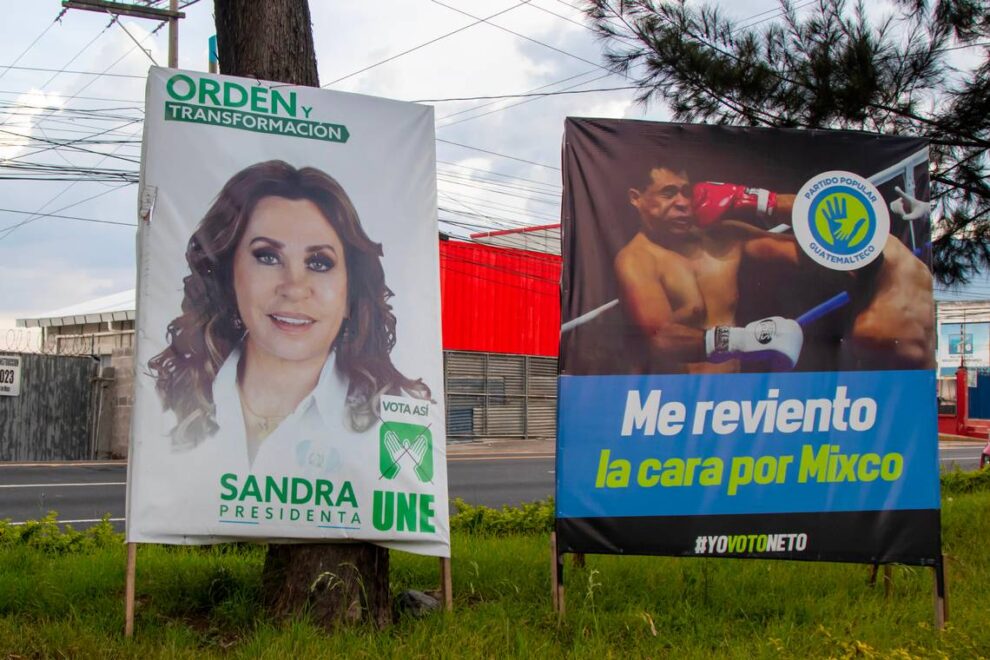The latest attack on democratic norms and institutions in Northern Central America took place this month in Guatemala, where the government moved to suspend the presidential campaign of anti-corruption candidate Bernardo Arévalo by alleging irregularities in the registration of his political party, the Semilla Movement. The move against Arévalo, who is challenging Sandra Torres in a runoff election on Aug. 20, is the most recent example of authorities in the region undermining democratic checks and balances in bids to maintain and expand their own power. The pace of democratic backsliding is picking up in the Northern Central American countries of El Salvador, Guatemala and Honduras. But there is an opportunity to interrupt this dynamic in Guatemala that could help the region rebalance. Guatemalans, with support from the international community, must continue to insist that a free and fair electoral process proceed without further interference.
El Salvador, Honduras, and Guatemala have faced staunch internal resistance to building strong democratic institutions that would hold entrenched political interests accountable over the three decades since they emerged from a period of internal conflicts and authoritarian governance. They have seen a reconcentration of power at the expense of due process and separation of powers in recent years. El Salvador elected a brash young president, Nayib Bukele, who took office four years ago promising to clamp down on gang violence and move the country rapidly into the 21st century. Citizen security has improved remarkably, though at a high cost in terms of abuses of due process rights through an extended “state of emergency.” The private sector has remained hesitant to invest, and job creation has been inadequate. The president’s legislative majority supported his efforts to stack El Salvador’s Supreme Court with loyalists and force the early retirement of hundreds of judges. Yet, in a move that would strengthen his party’s majority, the country adopted an electoral reform on June 7 that will shrink the number of congressional seats. The president recently announced he would run again in February 2024, despite constitutional laws that prohibit incumbents’ reelection. Honduras elected a hard-left president, Xiomara Castro, who took office 18 months ago determined to roll back market reforms and put the state back in charge of the economy. The result has been widespread power outages, faltering investment and anemic job creation. In a bid to reassert control, Castro stepped up her own crackdown on gang violence in June by putting the military police in charge of prisons after a conflict between inmates from rival gangs caused a deadly fire in a women’s prison. Guatemala elected a right-leaning president, Alejandro Giammattei, who took office three and a half years ago determined to move the country past a divisive period of aggressive action against corruption that had sent political and business leaders alike to prison. The result has been relatively strong investment, both by Guatemalan and international firms, thanks to a business-friendly environment and low production costs. But Guatemala’s political leadership has enjoyed increasingly free rein to sideline and intimidate anyone working to root out corruption in the country since deciding in 2016 to dismantle the International Commission against Impunity in Guatemala (CICIG). Dozens of former judges and prosecutors have been pressured into exile, while others such as Virginia Laparra and independent media editor Jose Ruben Zamora languish in prison on spurious charges.
This resistance to accountability was again on display July 12 when Guatemala’s internal security agency, the Public Ministry, alleged that the Semilla Movement’s initial filings included registration paperwork irregularities. The Public Ministry took the matter to a criminal court, which ruled the party’s status moot and excluded it from the second round of voting. Under Guatemalan election law, once an election has begun, parties cannot be excluded. Moreover, matters involving party registration and election administration are explicitly reserved for the country’s Supreme Electoral Tribunal (TSE in Spanish), not criminal courts. Finally, a raid carried out by the Public Ministry against the offices of the TSE on July 13, during which police officers were videotaped removing boxes of documents, appears to violate separation of powers. The Guatemalan government should respect electoral law, the authority of the TSE and the constitution, and allow the election to take place unencumbered. The Guatemalan people should advocate for their democracy through participatory channels such as peaceful assembly, petitioning their representatives and supporting the press as it covers these events. The international community should continue to draw attention to attempts to manipulate Guatemala’s election outcome, as the U.S. government and the Organization of American States (OAS) have done, by issuing public statements calling for the will of the Guatemalan people to be respected as they exercise their right to vote. The United States could also consider adding individuals involved in any further manipulation of the electoral process to Engel’s List for undermining democratic institutions and processes, which makes corrupt and undemocratic actors ineligible for a U.S. visa. Democracy has been under enormous pressure in Central America for the past generation, and it’s perhaps understandable that people have grown impatient. But the region’s authoritarian experiment, costumed in increasingly threadbare democratic garb, is planting the seeds of future turmoil with its abuses of institutional integrity.
Source: Miami Herald









